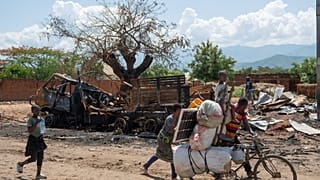hunger
Global food insecurity and malnutrition continued to worsen in 2024, with 295 million people suffering from acute hunger across 53 countries, the United Nations Food and Agriculture Organization (FAO) and its partners said in a report released on Friday.
The figure represents an increase of 13.7 million compared to 2023, marking the sixth consecutive annual rise in acute food insecurity in the world's most fragile regions.
The findings were published in the 2025 Global Report on Food Crises by the Global Network Against Food Crises (GNAFC), an international alliance comprising the FAO, the UN World Food Programme (WFP), and various governmental and non-governmental organizations.
UN Secretary-General Antonio Guterres described the figures as "another unflinching indictment of a world dangerously off course."
In the report's foreword, he warned that "hunger and malnutrition are spreading faster than our ability to respond, yet globally, a third of all food produced is lost or wasted."
He added that long-standing crises are now being compounded by a more recent one: a dramatic reduction in lifesaving humanitarian funding.
While acute food insecurity typically stems from a combination of factors - such as poverty, economic shocks, and extreme weather, the report emphasized that conflicts remained the primary driver in many of the worst-hit regions. Some populations face conditions beyond acute hunger.
Famine was confirmed in parts of Sudan in 2024, while catastrophic levels of food insecurity were recorded in the Gaza Strip, South Sudan, Haiti, and Mali.
In Gaza, famine was narrowly averted thanks to stepped-up humanitarian aid, but the report warned that the risk could return between May and September 2025 if the large-scale military operation and blockade continue.
The report also highlighted the severe impact of forced displacement. Of the 128 million people forcibly displaced in 2024, nearly 95 million - including internally displaced persons, asylum seekers, and refugees - were living in countries already grappling with food crises.
In addition, economic shocks triggered food insecurity in 15 countries, affecting 59.4 million people, including Afghanistan, South Sudan, Syria and Yemen.
Also, extreme weather events pushed 18 countries into crisis, impacting more than 96 million people, particularly in Southern Asia, Southern Africa, and the Horn of Africa.











01:15
US pledges $2 billion to UN aid amid deep foreign assistance cuts
01:00
Sudan: UN says RSF killed 1,000 civilians in Zamzam refugee camp in April
01:08
M23 announces withdrawal from Uvira following US pressure
01:23
Donald Trump defends first year back in office in politically charged speech
01:01
Sudan's transitional leader al-Burhan holds talks with Saudi Crown Prince in Riyadh
Go to video
South Sudan grounds UN aircraft and alleges illegal surveillance and smuggling